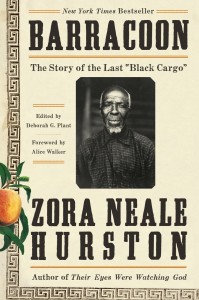
After reading The Confessions of Nat Turner, a fictional account of the leader of the 1831 slave uprising, I wanted to read a first person account from someone who had been a slave. This slim book, subtitled The Story of the Last “Black Cargo,” fits the bill.
I was already familiar with Hurston from her novels, such as Their Eyes Were Watching God, and knew she had studied with the pioneering anthropologist Franz Boas. Here, she combines her anthropologist and storyteller skills to give us the story of Cudjo Lewis in his own words.
Born in the town of Banté in West Africa, Kossola, as he was known then, was captured by the Dahomey when they destroyed his town, taking the teenager and others to sell as slaves. At the time Hurston interviewed him in 1927, he was thought to be the only person still alive who had made the gruesome Middle Passage from Africa to the United States. His was the last group of slaves to make that journey.
A storyteller in the griot tradition, Kossola describes what life was like in his town, including marriage customs, how murderers are punished, and his own training to be a man. He tells of the Dahomey raid—“ ‘I see de people gittee kill so fast! De old ones dey try run ‘way from de house but dey dead by de door, and de women soldiers got dey head’”—and the long march to Dahomey where they are kept in the barracoon, or barracks, until the White slave traders come.
Hurston captures his voice by representing his dialect. Although I usually tire easily when trying to read dialect, I had no trouble here, easily falling into Kossola’s voice. The dialect adds authenticity to his story.
Dey takee de chain off us and placee us in de boats . . . When we ready to leave de Kroo boat and go in de ship, de Many-costs [a derisive term for the Kroos, an African tribe that works for the white men, called that because many of them can be hired for the cost of a good worker] snatch our country cloth off us. We try save our clothes, we ain’ used to be without no clothes on. But dey snatch all off us. Dey say, ‘You get plenty clothes where you goin’.’ Oh Lor’, I so shame! We come in de ‘Merica soil naked and de people say we naked savages. Dey say we doan wear no clothes. Dey doan know de Many-costs snatch our clothes ‘way from us.
He goes on to describe his life as a slave, which lasted a little over five years, and after abolition, when he and the other slaves who had been brought on the Clotilda, those who hadn’t been sold elsewhere, built a town for themselves that they called African Town, today a community known as Africatown or Plateau, Alabama.
Religion is important to him and he is active in his church. He doesn’t see a disconnect between the faith of his childhood and the Christianity he learned in Alabama. He says that they worshiped the same god back in Africa, though they called him Alahua. Because they couldn’t read the Bible, they didn’t know he had a son.
This is not a traditional slave narrative, the story of an enslaved person escaping, trying to survive in the wilderness as they struggle to reach a place where they will be free. Instead, it starts with a free man, captured at 19 by fellow Africans and sold to White slavers—a fact that startled Hurston who had not realised that Black people were as responsible for the slave trade as White.
Hurston gives us a man who, despite the trauma and tragedies of his past, is someone much like us: retired, working in his garden, enjoying a good peach. We feel his love for his wife and their grief over the loss of two of their three children. His words touch us, especially his heartsick knowledge that he will now never see Africa again. He hopes that someday someone will carry his words back to that town in Africa where people will recognise his name and welcome him home.
This is a remarkable primary source for a time before any of us were born. Hurston completed the book in 1931, but it was rejected by publishers, partly because of the dialect. It was not published until 2018.
Do you ever pair two books that you’re reading, so that one complements the other?
